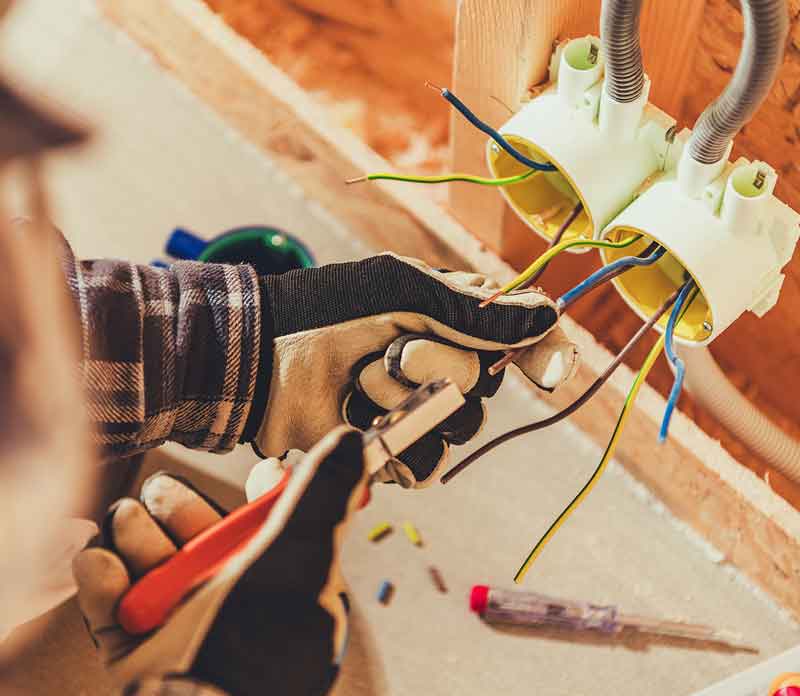Dangers of Aluminum Wiring

If you’re purchasing an older home or live in a structure built before 1972, there’s a good chance it still has aluminum wiring. The use of aluminum wire became commonplace when there was a shortage of copper in the 1960s, so home builders sought a suitable alternative. Structures built between 1965 and 1975 are most likely to have aluminum electric wiring that is no longer considered safe, as it tends to degrade more quickly than copper.
How Does Aluminum Wiring Work?
Aluminum and copper wiring work in much the same way. However, aluminum does have properties that make it a much less favorable electrical conductor. For example, it has a higher resistance to electrical current flow, so larger diameter wires are needed to support the same amperage.
Aluminum wires are also less ductile, making them more susceptible to wear. They are prone to galvanic corrosion triggered by contact with dissimilar metals as well as oxidation, which forms aluminum oxide, a less conductive material. In addition, aluminum is more malleable, meaning it is softer and more easily compressed or deformed.
Nonetheless, aluminum is still used for service wires and 240-volt circuits. This form is different than the alloy used in the 1960s and 1970s that is of most concern.
Dangers
Some of the telltale signs of trouble include flickering lights, hot switch faceplates, and faulty circuits. You may also smell a burning plastic odor near outlets and switches. The greatest inherent dangers of aluminum as an electrical wire material include:
- Poor Connection Points: Aluminum easily deforms if you overtighten a screw, while temperature fluctuations trigger greater thermal expansion and contraction than with copper, which can loosen connections. Although aluminum wiring is safest with screw-type connections, it tends to loosen given its high intolerance to stress. Even the vibration of electrical current can damage aluminum wiring Another concern is if aluminum and copper wiring have been combined; without the proper connections, gaps can form and lead to serious problems.
- Potential Fire Hazard: Aluminum electrical wiring is a fire hazard. Deteriorated connections, along with exposed wires, can lead to overheating, which in turn increases the risk of an electrical fire. The greater electrical demands of modern appliances used in homes today further exacerbates this hazard. Already deteriorated wiring and connections can be strained to their limit. The result can be a devastating home fire that could have been avoided by taking steps to identify aluminum wiring in your home and replacing it with safer materials.
How To Identify Aluminum Wiring
Telling whether a wire is copper or aluminum can be difficult. Both are enclosed in a plastic sheath. An aluminum wire should be labeled “AI” or “Aluminum” with embossments on the outer jacket (wires manufactured before May 1977 will have markings every 12 inches). It can be hard to distinguish either type of wire, even with visible electrical cables in a garage or an unfinished basement. Contact an electrician for a professional inspection if you aren’t sure.
Consider Replacing Your Aluminum Electric Wiring
Due to safety hazards, and the fact it can make your home uninsurable, aluminum electric wiring should be replaced. Complicating matters is that the Consumer Products Safety Commission (CPSC) has said failing connections rarely provide advance warning signs of a problem. Although various solutions have appeared to repair aluminum wires with special connectors, your best option is to replace and upgrade your wiring.
Replacement is the most thorough approach and surest way to maximize your electrical safety. Attempting such a project yourself comes with a high risk of costly mistakes. That’s why you need to hire an electrician to inspect, repair, and replace aluminum wiring and make sure your home is up to code.
Contact Express Electrical Services
Our electricians have the training, experience, and tools to safely replace aluminum electric wiring in Southern California homes. We are available 24/7 and for same-day service as well as committed to 100% satisfaction. Specials, coupons, and financing are provided to help you save on electrical projects. When you need electrical services by a Los Angeles, Riverside County, or Orange County electrician, call us at 323-727-7799 right away.
